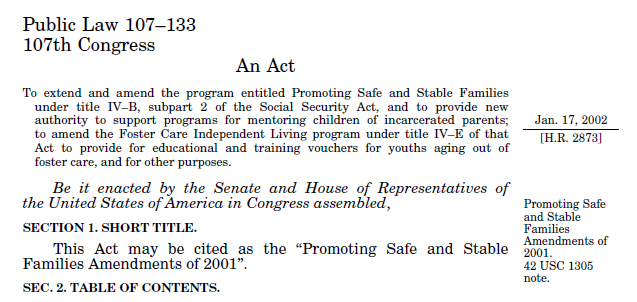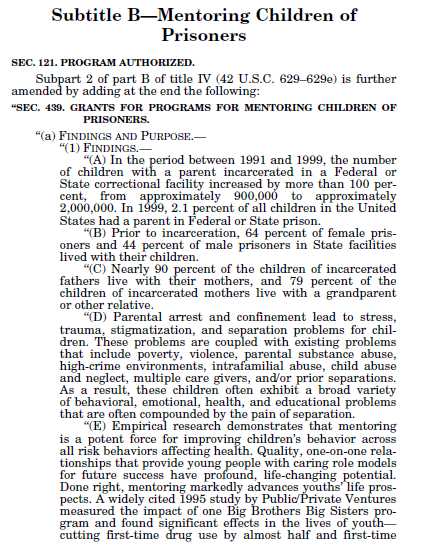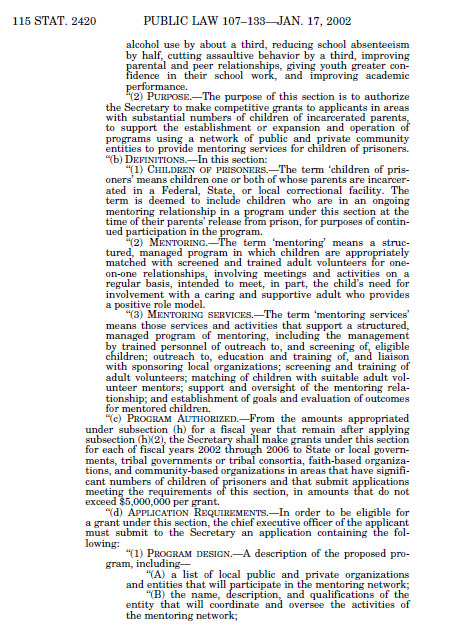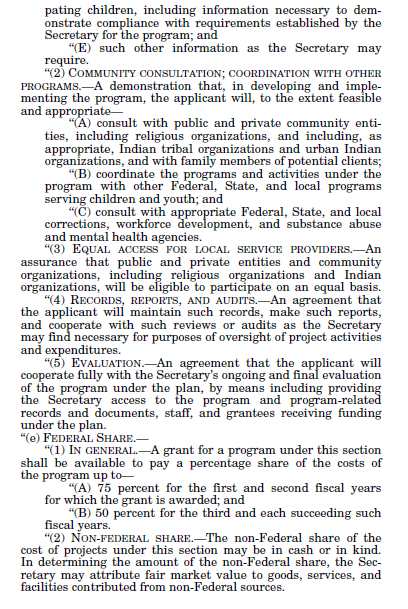MCP suppstate 2010 Final1
MCP suppstate 2010 Final1.doc
Mentoring Children of Prisoners Data Collection Process (MCPDCP)
OMB: 0970-0266
Mentoring Children of Prisoners Data Collection Process
(Quarterly Caseload Data Report)
OMB # 0970-0266
Supporting Statement
Family and Youth Services Bureau
Administration on Children, Youth and Families
Administration for Children and Families
U.S. Department of Health and Human Services
March, 2010
Table of Contents
A. Justification
1. Circumstances Making the Collection of Information Necessary 3
2. Purpose and Use of the Information Collection 3
3. Use of Improved Information Technology and Burden Reduction 3
4. Efforts to Identify Duplication and Use of Similar Information 3
5. Impact on Small Businesses or Other Small Entities 4
6. Consequences to Federal Programs or Policy Activities 4
Special Circumstances Relating to the Guidelines of 5 CFR 1320.5 4
Comments in Response to the Federal Register Notice and Efforts to Consult Outside the Agency 4
Explanation of Any Payment or Gift to Respondents 4
10. Assurance of Confidentiality Provided to Respondents 4
11. Justification for Sensitive Questions 5
12. Estimates of Annualized Burden Hours and Costs 5
13. Estimates of Other Total Annual Cost Burden to Respondents and Record Keepers 5
14. Annualized Cost to Federal Government 6
Explanation for Program Changes or Adjustments 6
Plans for Tabulation and Publication and Project Time Schedule 6
17. Reason(s) Display of OMB Expiration Date is Inappropriate 7
18. Exceptions to Certification for Paperwork Reduction Act Submissions 7
Statistical Methods (used for collection of information employing
statistical methods)
Respondent Universe and Sampling Methods 7
Procedures for the Collection of Information 7
Methods to Maximize Response Rates and Deal with Non Response 7
Test of Procedures or Methods to be Undertaken 7
Individuals Consulted on Statistical Aspects and Individuals Collecting 7 and/or Analyzing Data
EXHIBIT 1: Federal Register Notice Appendix A
EXHIBIT 2: Legislation Authority 8
EXHIBIT 3: Collection Instrument Appendix B
A. Justification
1. Circumstances Making the Collection of Information Necessary: The Child and Family Services Improvement Act of 2006 amends Title IV–B of the Social Security Act (42 U.S.C. 629– 629e) to provide funding for nonprofit agencies that recruit, screen, train, and support mentors for children with an incarcerated parent or parents. The Mentoring Children of Prisoners program (MCP) is administered by the Family and Youth Services Bureau (FYSB) of the Administration for Children and Families in the U.S. Department of Health and Human Services.
The legislation includes requirements for grantees to meet goals for children matched, which are negotiated after the award is given. It also requires grantees to provide information that can be used to evaluate outcomes for participating children, including information necessary to demonstrate compliance with requirements established by the Secretary for the program.
The legislation also requires the Secretary to evaluate the programs and report to Congress. The data will supplement evaluation activities and is designed to provide key indicators of relationship quality to established models of mentoring effectiveness.
2. Purpose and Use of the Information Collection: Data will be analyzed to drive training and technical assistance, identify targets, monitor progress, and implement strategies to achieve goals. FYSB will need this information to assure effective service delivery and program management and to monitor ongoing caseloads, training, demographics, etc.
Finally, data from this collection will be used for reporting outcomes and efficiencies under the Government Performance and Results Act (GPRA). It will provide input for Congressional hearings and inform philanthropic interests and research efforts in addition to FYSB’s.
3. Use of Improved Information Technology and Burden Reduction: A previous design of data collection was in Microsoft Excel; now the data is collected through an Online Data Collection system which allows data to inputted and transferred through a secure website. Grantees receive training at national conferences; they also receive updates and helpful hints through their general, monthly training and technical assistance newsletter, and emails sent from Federal staff as warranted. Additionally, grantees receive additional technical support via email and a 1-866 number and information and helpful hints are contained through the data collection instrument itself.
4. Efforts to Identify Duplication and Use of Similar Information: MCP is a program that targets a very specific population. While some grantees have previous experience operating mentoring programs, including those for children of prisoners, many grantees are starting up for the first time. There is no existing system that collects the data called for or implied by the authorizing legislation.
Moreover, the data in this form is being collected from the same grantees by no other part of FYSB. Grantees routinely provide financial and narrative progress reports, and onsite monitoring protocols are under consideration, but the information in all these areas will be unique and distinct from the present collection.
5. Impact on Small Businesses or Other Small Entities: FYSB’s approach to data collection and reporting is to minimize paperwork, eliminate unnecessary duplication, and allow service providers to spend most of their time providing services. Training and technical support are provided on request and/or an ongoing basis to assist in minimizing such impacts on entities and organizations with lesser resources.
6. Consequences of Collecting the Information Less Frequently: FYSB continues to use the data to monitor the program’s growth and performance; the data is used as a primary tool for grantee oversight and drives the training and technical assistance plan. The data is used to report to Congress on the program’s effectiveness, as mandated by the authorizing legislation and to meet GPRA requirements. Without this information, we will be unable to manage the achievement of targets, identify barriers to service effectiveness and other areas of concern, or focus technical assistance and monitoring.
FYSB needs to continue to monitor the progress of the program and individual grantees at the current frequency levels. Match relationship terminations and rematch waiting list durations can have a major impact on youth development and are tracked on a quarterly basis. For example, a termination, even if not initiated by the mentor, can be seen by a child as rejection or abandonment, which they may already have felt when their father or mother was taken away during imprisonment. Additionally, match relationships that involve significantly fewer than weekly meetings of approximately one hour are troubling since they indicate a mentor may not be living up to his/her commitment. By comparing these factors quarterly with information about how many mentors the agency has retrained or counseled about their responsibility, we can learn early on whether an agency is establishing successful mentoring experiences and allows us the opportunity to provide the necessary support or intervention if needed.
7. Special Circumstances Relating to the Guidelines of 5 CFR 1320.5: None are applicable.
8. Comments in Response to the Federal Register Notice and Efforts to Consult Outside the Agency: On December 18, 2009 the first notice was published in the Federal Register, Vol. 74, Number 242, pages 67231 - 67232. (See Exhibit 1 (Appendix A) for Federal Register notice)
The original instrument design was done after consulting with grantees and experts in the field of mentoring. During the Federal Register notice time, no requests came for a copy of the instrument, and no public comments were received.
9. Explanation of Any Payment or Gift to Respondents: There is no remuneration of any kind for respondents.
10. Assurance of Confidentiality Provided to Respondents: This instrument only acquires aggregate caseload information. Protection of privacy and individual case files is a responsibility of the agency as required by FYSB. As such we may examine agency diligence in this regard through onsite monitoring or other means.
11. Justification of Questions of a Sensitive Nature: There are no questions in this instrument that are either sensitive or focused upon single individuals.
12. Estimates of Annualized Burden Hours and Costs:
Annual Burden Estimates |
||||
Instrument |
Number of respondents |
Number of responses per respondent |
Average burden hours per response |
Total annual burden hours |
MCP Online Data Collection |
205 |
4 |
3 |
2460 |
Hourly dollar equivalent is 2,460 times $25 per hour which equals $61,500.
13. Estimates of Other Total Annual Cost Burden to Respondents and Record Keepers:
Task / Item |
Annual Number |
Annual Cost Per Respondent |
Estimated Annual Cost |
Training: Not needed. If form instructions are not well understood, grantees are encouraged to call technical support. |
FYSB for guidance. |
$0 |
$0 |
Hardware: A basic computer with internet capability and connection. This is a one-time cost to each grantee, if it does not already have the appropriate hardware (cost based on depreciating value consistent over three years)..
|
205 |
$150 |
$30,750 |
System Maintenance
|
205 |
$100 |
$20,500 |
Supplies (Diskettes, Mail, etc) |
205 |
$0 |
$0
|
Total Cost per Respondent |
|
$490 |
|
Total for all 205 Grantees |
|
|
$49,200 |
14. Annualized Cost to Federal Government:
Task / Item |
Estimated Annual Cost
|
Contractor provides supplemental technical support and develops special applications |
$83,000 |
Federal Gov’t Staff(program analysis officer @ .15 FTE) |
$16,200 |
printing, emailing, overhead |
$1000 |
Total |
$100,200 |
15. Explanation for Program changes or Adjustments: The change in burden is to account for a change in number of the total grantees/respondents.
16. Plans for Tabulation and Publication and Project Time Schedule: FYSB will compile the data and as discussed earlier in this document, e.g., under “Use of Data” and “Consequences,” apply it to numerous performance, case load and demographic objectives. Statistical analysis will be part of the examination of collected information.
Publication of findings based on the data via print or website display or distribution as documents via electronic means is certainly a possibility so as to share information with technical assistance providers, grantees, researchers and other interested parties. The required Report to Congress of April 15, 2005, (see legislation in Exhibit 2) and any subsequent reports will become publicly available after its submission.
Project Time Schedule:
FYSB submits 2nd Federal Register Notice for publication |
Late June FY10 |
End of 2nd 30 day comment period |
Late July FY10
|
Negotiate final changes with OMB |
August FY10 |
FYSB anticipates approval from OMB, if not sooner |
Late August FY10 |
FYSB distributes final version to new grantees |
September FY10 |
All grantees receive guidance as needed. |
October FY10 – December FY11 |
17. Reason(s) Display of OMB Expiration Date is Inappropriate: Due to the request for extension, the expiration date should reflect 3 years from the approval date.
18. Exceptions to Certification for Paperwork Reduction Act Submissions: Non Applicable
B. Statistical Methods (used for collection of information employing statistical methods)
19. Respondent Universe and Sampling Methods: Every individual in the agencies caseload will be included in each aggregate. No samples will be used in this effort.
20. Procedures for the Collection of Information: Agencies will be required to submit quarterly performance data through the OLDC system. Data will be downloaded to provide analysis at the agency, regional or national level.
21. Methods to Maximize Response Rates and Deal with Nonresponse: As a condition of their award, all grantees are required to submit quarterly performance data. Because of this prior understanding we have routinely achieved maximum response rates. Project Officers, however, will follow up with grantees to ensure timely submission.
22. Test Procedures or Methods to be Undertaken: Non Applicable
23. Individuals Consulted on Statistical Aspects and Individuals Collecting and/or Analyzing Data: As is the case with our current OMB approved data collection process, we will be working with Abt Associates, Inc. 55 Wheeler Street, Cambridge, MA (617) 492-7100 Catherine Dunn Rappaport. Abt Associates has worked with us in the development of the data collection instrument and will provide support through out the collection and analysis stages.
EXHIBIT 2: Legislative/Regulatory Authority
NOTE: The MCP program was reauthorized in 2008, but the legislative language is mostly citations and references to minor changes in the original Act. The original requirements (below) changed little except to add a demonstration project unrelated to this application. We are providing this programmatically valid earlier version since it clearly describes the evaluation and data collection authority that has been in place since the program’s inception, while the 2008 version incorporates them only by reference and without description.

(Continued on following pages. See (d)(4) and (5) on page 11.)




| File Type | application/msword |
| Author | CSC Employee |
| File Modified | 2010-09-27 |
| File Created | 2010-09-08 |
© 2026 OMB.report | Privacy Policy